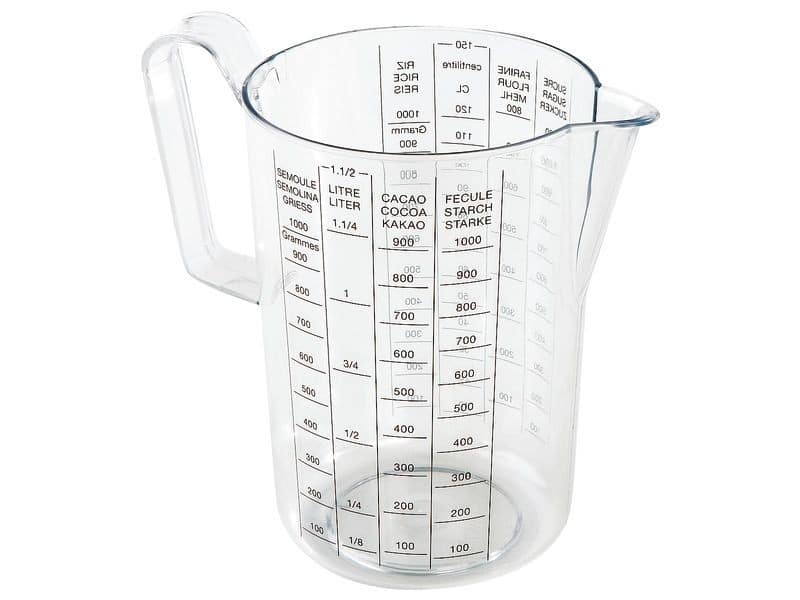For some it is difficult to convert centiliters to milliliters and vice versa, especially without measuring cups. Whether you're a seasoned cook or a beginner, knowing how to convert measurements of liquids is beneficial in the kitchen because it allows you to follow recipes exactly. It can also be useful in chemistry classes in middle school and high school.
To help you not waste your time, we are going to give you some tips for learn how to quickly convert measurements of liquids.
The conversion rule
To understand how to make these changes correctly, it is essential to know the two liquid measurements.
- The centiliter corresponds to one hundredth of a liter and about 10 grams of pure water.
- the milliliter corresponds to one thousandth of a liter, and to about 1 gram of pure water.
1 centiliter (cl) = 10 milliliters (ml)
In general, converting from cl to ml involvesadd a 0 to the number that indicates milliliters (and eliminate it, when converting from ml to).
In other words multiply by 10 the number of centilitres to obtain the number of millilitres, or divide the number of millilitres by 10 to obtain the number of centilitres.
Cl to ml, and ml to cl: everything you need to know
Liquid unit conversions
To give you a hand in converting units of liquids, here's a helpful reminder:
- 10 cl in ml =100 millilitres
- 15 cl in ml = 150 milliliters
- 20 cl in ml = 200 millilitres
- 25 cl in ml =250 millilitres
- 50 cl in ml = 500 millilitres
- 150 ml in cl = 15 cl
- 200 ml in cl = 20 cl
- 250 ml in cl = 25 cl
- 400 ml in cl = 40 cl
- 100 ml in cl = 10 cl
We also have this table which lists the most commonly used conversions from cl to ML.
| 10 cl | 100ml |
| 100ml | 10 cl |
| 100 cl | 1000ml |
| 150ml | 15 cl |
| 20 cl | 2200ml |
| 25 cl | 250ml |
| 30 cl | 300ml |
| 400ml | 40 cl |
| 50 cl | 500ml |
| 60 cl | 600ml |
| 100 cl | 1000 milliliters |
If you want to convert to liters:
- 100cl in l, this gives 0.1 litre.
- 50cl to liter, this gives 0.05 liters.
In this case, you need to get used to converting to easily understand how conversion works.
Other conversions for volume units
You have probably noticed that in some recipes the amount of liquid ingredients is indicated in grams. How to convert milliliters (but also centiliters and liters) into volume units?
It's simple: 1 liter of water (corresponds to 1000ml or 100 cl, and weighs 1 kilogram (1000 grams).
Here are some examples :
- 10 cl of water = 100 ml which is equivalent to 100 g
- 25 cl of water = 250 ml = 250 grams
- 100 g of water = 100 ml or 10 cl
- 350 g of water = 350 ml or 35 cl
- 500 g of water = 500 ml or 50 cl
Other questions :
And for quarters?
- 1/4 liter in ml250 millilitres.
What does cl in ml mean?
- That means centiliters to milliliters.
What about other liquid ingredients?
In general, this conversion measure also applies to to other liquids of the same density, such as wine and milk.
- 50 cl of milk in mlthis gives 500ml milk.
Conversion tables used for the kitchen
Some recipes use different and less precise units which can cause doubts and confusion when converting to other measurements.
Here are some examples to help you change the various units cooking :
- 1 tablespoon equals 1.5 cl
- 1 teaspoon equals 0.5 cl
- 1 cup of coffee is equivalent to 10 cl
- 1 large glass is equivalent to 25 cl
- 1 bowl equals 35 cl
Now that you have everything you need to know how much liquid you need in your kitchen, let's cook! With our conversion techniques, tracking recipes accurately will be simple.
If you still have doubts, you can check the quantities of ingredients you use in the kitchen by using a measuring cup or a food scale!










